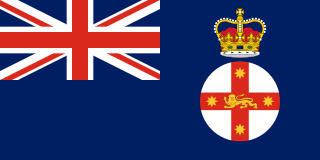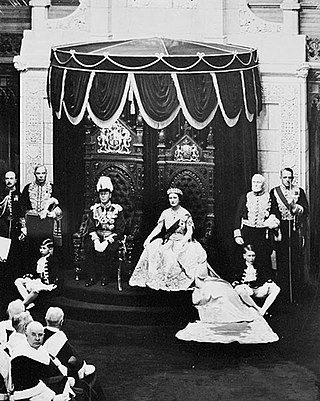
The governor of New South Wales is the viceregal representative of the Australian monarch, King Charles III, in the state of New South Wales. In an analogous way to the governor-general of Australia at the national level, the governors of the Australian states perform constitutional and ceremonial functions at the state level. The governor is appointed by the monarch on the advice of the premier of New South Wales, and serves in office for an unfixed period of time—known as serving At His Majesty's pleasure—though five years is the general standard of office term. The current governor is retired judge Margaret Beazley, who succeeded David Hurley on 2 May 2019.

The Statute of Westminster 1931 is an act of the Parliament of the United Kingdom that sets the basis for the relationship between the Commonwealth realms and the Crown.

The Irish Free State, also known by its Irish name Saorstát Éireann, was a state established in December 1922 under the Anglo-Irish Treaty of December 1921. The treaty ended the three-year Irish War of Independence between the forces of the Irish Republic – the Irish Republican Army (IRA) – and British Crown forces.

The Union of South Africa was the historical predecessor to the present-day Republic of South Africa. It came into existence on 31 May 1910 with the unification of the Cape, Natal, Transvaal, and Orange River colonies. It included the territories that were formerly a part of the South African Republic and the Orange Free State.

The governor-general of the Irish Free State was the official representative of the sovereign of the Irish Free State from 1922 to 1936. By convention, the office was largely ceremonial. Nonetheless, it was controversial, as many Irish Nationalists regarded the existence of the office as offensive to republican principles and a symbol of continued British involvement in Irish affairs, despite the Governor-General having no connection to the British Government after 1931. For this reason, the office's role was diminished over time by the Irish Government.

Royal assent is the method by which a monarch formally approves an act of the legislature, either directly or through an official acting on the monarch's behalf. In some jurisdictions, royal assent is equivalent to promulgation, while in others that is a separate step. Under a modern constitutional monarchy, royal assent is considered little more than a formality. Even in nations such as the United Kingdom, Norway, the Netherlands, Liechtenstein and Monaco which still, in theory, permit their monarch to withhold assent to laws, the monarch almost never does so, except in a dire political emergency or on advice of government. While the power to veto by withholding royal assent was once exercised often by European monarchs, such an occurrence has been very rare since the eighteenth century.

A Commonwealth realm is a sovereign state that has Charles III as its monarch and head of state. Charles succeeded his mother, Elizabeth II, as monarch immediately upon her death on 8 September 2022. All the realms are equal with and independent of the others, though one person, resident in the United Kingdom, acts as monarch of each. The phrase Commonwealth realm is an informal description not used in any law.

The Australia Act 1986 is the short title of each of a pair of separate but related pieces of legislation: one an Act of the Commonwealth Parliament of Australia, the other an Act of the Parliament of the United Kingdom. In Australia they are referred to, respectively, as the Australia Act 1986 (Cth) and the Australia Act 1986 (UK). These nearly identical Acts were passed by the two parliaments, because of uncertainty as to whether the Commonwealth Parliament alone had the ultimate authority to do so. They were enacted using legislative powers conferred by enabling Acts passed by the parliaments of every Australian state. The Acts came into effect simultaneously, on 3 March 1986.
In the British Empire, a self-governing colony was a colony with an elected government in which elected rulers were able to make most decisions without referring to the colonial power with nominal control of the colony. This was in contrast to a Crown colony, in which the British Government ruled and legislated via an appointed Governor, with or without the assistance of an appointed Council. Most self-governing colonies had responsible government.

From 1910 to 1961 the Union of South Africa was a self-governing country that shared a monarch with the United Kingdom and other Dominions of the British Empire. The monarch's constitutional roles were mostly delegated to the Governor-General of the Union of South Africa.
The state known today as Ireland is the successor state to the Irish Free State, which existed from December 1922 to December 1937. At its foundation, the Irish Free State was, in accordance with its constitution and the terms of the Anglo-Irish Treaty, governed as a constitutional monarchy, in personal union with the monarchy of the United Kingdom and other members of what was then called the British Commonwealth. The monarch as head of state was represented in the Irish Free State by his Governor-General, who performed most of the monarch's duties based on the advice of elected Irish officials.

The Statute of Westminster Adoption Act 1942 is an act of the Australian Parliament that formally adopted sections 2–6 of the Statute of Westminster 1931, an Act of the Parliament of the United Kingdom enabling the total legislative independence of the various self-governing Dominions of the British Empire. With its enactment, Westminster relinquished nearly all of its authority to legislate for the Dominions, effectively making them de jure sovereign nations.
Disallowance and reservation are historical constitutional powers that were instituted in several territories throughout the British Empire as a mechanism to delay or overrule legislation. Originally created to preserve the Crown's authority over colonial governments, these powers are now generally considered politically obsolete, and in many cases have been formally abolished.

The Scottish Militia Bill 1708 was a bill that was passed by the House of Commons and House of Lords of the Parliament of Great Britain in early 1708. However, on 11 March 1708, Queen Anne withheld royal assent on the advice of her ministers for fear that the proposed militia would be disloyal. This was due to the sudden appearance of a Franco-Jacobite invasion fleet en route to Scotland which gave ministers second thoughts, at the last minute, about allowing it to reach the statute books. As of 2023, it is the last occasion on which the royal veto has been used in Great Britain or the United Kingdom.

The constitution of New Zealand is the sum of laws and principles that determine the political governance of New Zealand. Unlike many other nations, New Zealand has no single constitutional document. It is an uncodified constitution, sometimes referred to as an "unwritten constitution", although the New Zealand constitution is in fact an amalgamation of written and unwritten sources. The Constitution Act 1986 has a central role, alongside a collection of other statutes, orders in Council, letters patent, decisions of the courts, principles of the Treaty of Waitangi, and unwritten traditions and conventions. There is no technical difference between ordinary statutes and law considered "constitutional law"; no law is accorded higher status. In most cases the New Zealand Parliament can perform "constitutional reform" simply by passing acts of Parliament, and thus has the power to change or abolish elements of the constitution. There are some exceptions to this though – the Electoral Act 1993 requires certain provisions can only be amended following a referendum.

The monarchy of Australia is a key component of Australia's form of government, embodied by the Australian sovereign and head of state. The Australian monarchy is a constitutional one, modelled on the Westminster system of parliamentary government, while incorporating features unique to the constitution of Australia.
Australia is a constitutional monarchy whose Sovereign also serves as Monarch of the United Kingdom, New Zealand, Canada and eleven other former dependencies of the United Kingdom including Papua New Guinea, which was formerly a dependency of Australia. These countries operate as independent nations, and are known as Commonwealth realms. The history of the Australian monarchy has involved a shifting relationship with both the monarch and also the British government.
A dominion was any of several self-governing nations of the British Empire. With the evolution of the British Empire into the Commonwealth of Nations, the dominions became independent states, either as commonwealth republics or commonwealth realms.

His Majesty King Edward the Eighth's Abdication Act, 1937 was an act of the Parliament of South Africa that ratified the abdication of King Edward VIII and the succession to the throne of King George VI. Although the South African cabinet had assented to the passage of His Majesty's Declaration of Abdication Act 1936 by the Parliament of the United Kingdom at the time of the abdication in December 1936, the South African act was passed in February 1937 to resolve legal uncertainties.
The Coloured vote constitutional crisis, also known as the Coloured vote case, was a constitutional crisis that occurred in the Union of South Africa during the 1950s as the result of an attempt by the Nationalist government to remove coloured voters in the Union's Cape Province from the common voters' rolls. It developed into a dispute between the judiciary and the other branches of government over the power of Parliament to amend an entrenched clause in the South Africa Act and the power of the Appellate Division to overturn the amendment as unconstitutional. The crisis ended when the government enlarged the Senate and altered its method of election, allowing the amendment to be successfully enacted.











